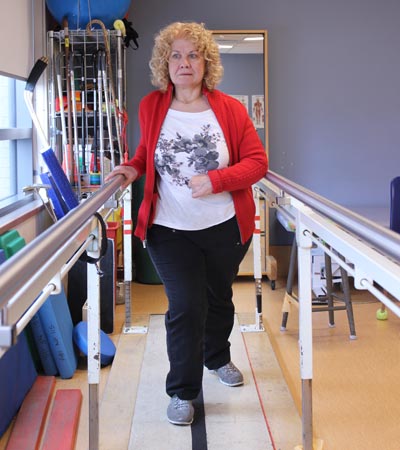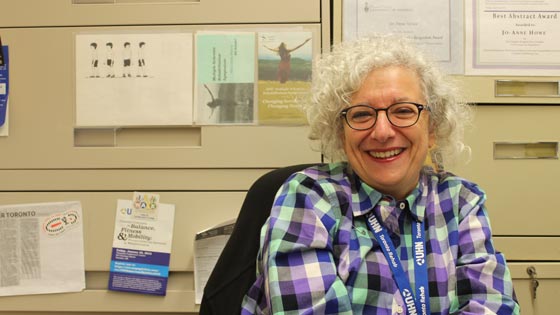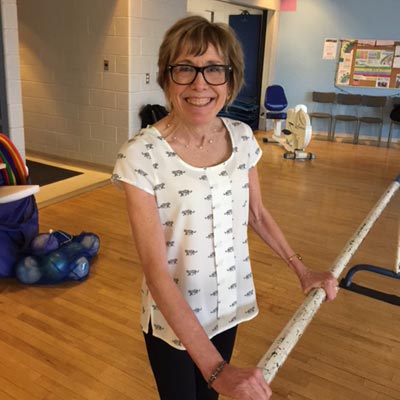
Connie Cardoso joined Toronto Rehab’s community-based TIME™ Program shortly after her stroke in 2009. “TIME has really helped me physically, socially and psychologically. It really helps to know you’re not alone in this.” (Photo: UHN)
In July of 2009, one month before her eldest son's wedding, Connie Cardoso suffered a stroke that left her wheelchair-bound on his wedding day.
This June, almost seven years later, she will be dancing at her younger son's wedding thanks to Toronto Rehab's community-based program, Together In Movement and Exercise (TIME).
TIME: Bringing rehab into the community
TIME™ was an idea born out of Toronto Rehab's neuro rehabilitation program in 2007 to address balance and mobility challenges in community members once discharged from hospital.
It is the 'brainchild' of Jo-Anne Howe, a clinical educator and physiotherapist at Toronto Rehab who spearheaded the program through a unique partnership with Toronto Parks, Forestry and Recreation.

Jo-Anne Howe, clinical educator and physiotherapist at Toronto Rehab, spearheaded the TIME™ program to address mobility and balances challenges for patients that had been discharged. (Photo: UHN News)
Today, TIME™ classes are held in over 40 community centres across Canada.
"It was very clear to us as physiotherapists that our patients – when discharged – need somewhere else to go to keep exercising to maintain their health and potentially improve their function," explains Jo-Anne.
"It embodies a new concept in healthcare which is that healthcare remains involved in the patient's life even after they're out in the community."
Specifically designed to address mobility and balance challenges in participants, Toronto Rehab's physiotherapists developed an exercise program for TIME™ classes, which they teach to fitness instructors in participating community centres. A supplementary
training tool kit is also provided with written and video resources.
Connie's story: recovering from a stroke with TIME™
After a three-month inpatient stay at Toronto Rehab, where she re-learned how to walk and build core strength following her stroke in 2009, Connie was discharged.
"You're really on your own after you're discharged. You have to deal with the fact that your whole life changed in a minute," Connie says.
Related links:
Shortly after, she was contacted by a Toronto Rehab employee who told her about TIME™. She has since attended the class twice per week in her local community centre.
"Knowing you have a place to go with peers in the same situation as you is very important. It really helps to know you're not alone in this," Connie says.
"Every class we try to accomplish something different; a new physical goal. TIME™ has really helped me physically, socially and psychologically. It's given me mobility, confidence and lifelong friends."
Elizabeth's story: a diagnosis of Multiple Sclerosis at 19

Elizabeth Flavelle, living with Multiple Sclerosis, says Toronto Rehab’s TIME™ program is the reason her strength and balance is as good as it is today. (Photo: Elizabeth Flavelle)
Elizabeth Flavelle, 66, was 19-years-old when she was told she had
Multiple Sclerosis, a neurological disease, and that her physical condition would deteriorate quickly.
"After my diagnosis, my ability to move decreased as time went on, so I started participating in different programs to help my physical condition," Elizabeth says.
Then, in 2008, she discovered TIME™ through the Multiple Sclerosis Society of Canada's Toronto Chapter newsletter.
"TIME has dramatically helped. I'm absolutely convinced that the exercises they provide have strengthened my legs, hands, shoulders and balance. It's done a phenomenal job at keeping me as well as I can be," says Elizabeth.
"It's an environment where everybody has something specific to achieve so it's okay to not be in tip-top shape. It's okay to progress at your own pace. The facilitators are so empathetic and supportive."
Who can join TIME™?
Any individual who is able to walk a minimum of 10 meters with or without a walking aid can enrol in the TIME™ program. TIME™ classes run an average of twice per week and each program runs for about 10 weeks. Many participants return for several sessions of the program.
"From the inception of this program, we wanted to create a model that would encourage patients to return," says Jo-Anne.
"Patients are never discharged from TIME."
Joanne Zee, Senior Clinical Director of the Brain and Spinal Cord Rehab Program at Toronto Rehab has been impressed with the momentum TIME has gained in communities across the country.
"We are so proud of this work and our physiotherapists who took the leap of faith to help patients integrate safely into the community," says Joanne. "It's benefited so many Canadians over the years."
Learn more about TIME™.
